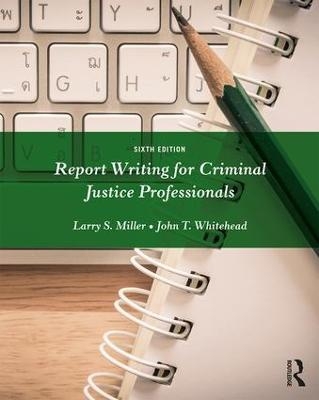
Report Writing for Criminal Justice Professionals
Routledge (Verlag)
978-1-138-28893-5 (ISBN)
The criminal justice process is dependent on accurate documentation. Criminal justice professionals can spend 50–75 percent of their time writing administrative and research reports. The information provided in these reports is crucial to the functioning of our system of justice. Report Writing for Criminal Justice Professionals, Sixth Edition, provides practical guidance—with specific writing samples and guidelines—for providing strong reports. Most law enforcement, security, corrections, and probation and parole officers have not had adequate training in how to provide well-written, accurate, brief, and complete reports. Report Writing for Criminal Justice Professionals covers everything officers need to learn—from basic English grammar to the difficult but often-ignored problem of creating documentation that will hold up in court. This new edition includes updates to reference materials and citations, as well as further supporting examples and new procedures in digital and electronic report writing.
Larry S. Miller is a Professor in the Department of Criminal Justice and Criminology at East Tennessee State University. A former law enforcement officer and crime laboratory director, Miller has authored or co-authored seven textbooks, including Police Photography, Crime Scene Investigation, and Effective Police Supervision. His research interests and journal publications are in the areas of policing and forensic science. John T. Whitehead is a Professor and former Chair in the Department of Criminal Justice and Criminology at East Tennessee State University. He completed his M.A. at the University of Notre Dame and earned his Ph.D. in Criminal Justice from SUNY-Albany. He teaches courses in corrections, criminal justice ethics, and the death penalty.
Acknowledgments. Introduction. SECTION 1: THE NATURE OF REPORT WRITING. 1 . The Why and How of Report Writing 2. Starting to Write 3. The Face Page 4. The Narrative—The Continuation Page and Follow-Up Report 5. Habits that Make for Speedy Writing 6. Other Types of Writing 7. Reading and Correcting Reports SECTION 2: THE MECHANICS OF REPORT WRITING 8. Simplified Study of Grammar 9. Avoiding Errors in Sentence Structure 10. Making Punctuation Work 11. Breaking the Spelling Jinx 12. Using or Abusing Words 13. Abbreviating and Capitalizing SECTION 3: THE MODERNIZATION OF REPORT WRITING 14. Innovations in Criminal Justice Report Writing. Appendix A: Model Reports. Appendix B: Examples of Agency Instructions for Completing Report Forms. Appendix C: Selected Readings. References. Index.
| Erscheinungsdatum | 06.11.2017 |
|---|---|
| Zusatzinfo | 42 Tables, black and white; 72 Line drawings, black and white; 1 Halftones, black and white; 73 Illustrations, black and white |
| Verlagsort | London |
| Sprache | englisch |
| Maße | 187 x 235 mm |
| Gewicht | 752 g |
| Themenwelt | Geisteswissenschaften ► Sprach- / Literaturwissenschaft ► Literaturwissenschaft |
| Recht / Steuern ► EU / Internationales Recht | |
| Recht / Steuern ► Privatrecht / Bürgerliches Recht ► Berufs-/Gebührenrecht | |
| Sozialwissenschaften ► Soziologie | |
| ISBN-10 | 1-138-28893-4 / 1138288934 |
| ISBN-13 | 978-1-138-28893-5 / 9781138288935 |
| Zustand | Neuware |
| Haben Sie eine Frage zum Produkt? |
aus dem Bereich


